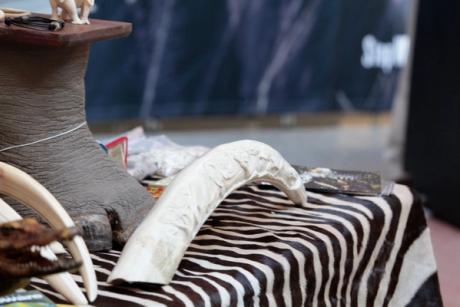
A Miami art dealer has been sentenced to more than four years in prison for illegally smuggling carvings containing ivory into and out of the United States and obstructing an investigation by authorities.
A jury this week found Eduardo Ulises Martinez guilty of nine counts of smuggling items containing ivory to and from the United States without declaring it or providing it for inspection by the US Fish and Wildlife Service (USFWS). ). Martinez was also convicted of obstruction of justice for soliciting false evidence, documents and testimony during the investigation, according to the U.S. Attorney’s Office for the Southern District of Florida.
According to the Department of Justice, Martinez purchased carvings containing ivory from auction houses in Spain, England, Canada and Australia and concealed the material in order to bring it to the United States. Martinez used various methods to smuggle the ivory, investigators found, including dismantling the carvings and shipping the ivory components separately to evade detection. He also arranged for third parties living in Spain and England to collect the carvings from European auction houses to make it look like the works would stay in the European Union, before having the ivory shipped to the states. -United. In each case, Martinez or someone working for him would falsely state that the ivory carvings were made of another material or give false descriptions to evade inspection. (Martinez had never reported wildlife, including ivory, to the USFWS, according to the Justice Department.)
Martinez sold the carvings containing ivory “at a significant markup” in the United States, according to the Justice Department, but also sold to buyers in other countries and facilitated the transportation of the ivory out of the country. country. The jury heard evidence that Martinez knew he was breaking the law but went on to make money, according to the Justice Department.
Martinez was caught with ivory in his luggage at Miami International Airport in September 2021. The Justice Department said he subsequently removed imported ivory from his showroom and asked a witness to provide false evidence and false testimony to investigators.
In addition to the 51-month prison sentence, Martinez was ordered by a federal judge to pay a $20,000 fine and must serve three years of supervised release after leaving prison. He confiscated “various sculptures containing ivory”, added the Ministry of Justice.
In 2016, the US government introduced a near-total ban on the trade in African elephant ivory, with exceptions only if they were sold as antiques. The USFWS said at the time nearly 100 elephants were killed every day to support the global ivory industry estimated at $23 billion.
Some jurisdictions in the United States have even stricter restrictions, such as New York, where a statewide mandate prohibits both the sale and display of items containing more than 20% African ivory. elephant and mammoth or less than 100 years old.
Last year, a New York appeals court considered the strict state ivory regulations after two groups of antique dealers filed a lawsuit claiming the law established unconstitutional restrictions on dealers and collectors.
